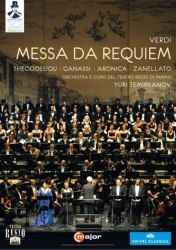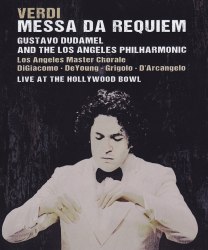| 

|
Giuseppe VERDI (1813-1901)
Requiem
Dimitra Theodossiou (soprano); Sonia Ganassi (mezzo); Francesco Meli (tenor); Riccardo Zanellato (bass)
Chorus and Orchestra of Teatro Regio di Parma/Yuri Temirkanov
rec. Teatro Farnese di Parma, Italy, 8 October 2011
Sound Format: PCM Stereo, DTS 5.1 Surround; Picture Format: 16:9; Region 0
Subtitles in Latin, English, German, French, Korean, Spanish, Chinese, Japanese
Reviewed in DTS 5.1
C MAJOR 725408 DVD VIDEO [Requiem: 95:00; Documentary: 52:00]
Requiem
Juliana DiGiacomo (soprano); Michelle DeYoung (mezzo); Vittorio Grigolo (tenor); Ildebrando D'Arcangelo (bass)
Los Angeles Master Chorale, Los Angeles Philharmonic Orchestra/Gustavo Dudamel
rec. Hollywood Bowl, Los Angeles, USA: 13 and 15 August 2013
Sound format: PCM Stereo, DTS HD Master Audio 5.1; Picture format: 16:9, 1080i; Region ABC
Subtitles in Latin, English, German, French, Korean, Spanish, Chinese, Japanese
Reviewed in DTS HD MA 5.1
C MAJOR 714804 Blu-ray [Requiem: 98:00; Bonus: 18:00]
Since the DVD from Parma appears to be the better value in terms
of time, let me deal with the large, 52 minute, bonus on that disc.
It is called 'Verdi's Backyard' and is a bit like one of those guided
tours you foolishly commit yourself to as part of your holiday package.
The excuse for including it is that Verdi was born in this area. It
contains no insights and is altogether rather amateurish in content.
Trust me, you do not need to know what it contains but the booklet
blurb promises we will 'get to know how Verdi "lives on" in the region
and has even formed the area ... ' By contrast the Dudamel disc has
as bonus an 18 minute interview with the young maestro and as such
it is at least more relevant. Personally I found it too full of phatic
language and short on concrete information.
The Parma film looks very grey; the hall, the chorus, the orchestra
and the picture quality. I would not put the last down to it being
DVD and not Blu-ray, but to a very ordinary master recording. The
sound is constrained and at times hints at someone or some computer
riding the gain controls. For example the Dies Irae does not
expand as it can on competing recordings. The camerawork is unobtrusive.
The soloists are all very satisfactory but the performance, whilst
precise, is not urgent and indeed seems a bit slow. It comes in at
7 minutes longer than my favoured video Requiem, that by Abbado and
the Berlin Philharmonic on EMI DVD (review).
In Temirkanov's favour, it does warm up near the end of the Libera
Me but by then it is, in several respects, too late. I would class
it as a decent run-of-the-mill performance which was probably very
satisfying to attend but with insufficient star quality to compete
in a crowded market.
The Los Angeles performance has star quality. What could be more starry
than the young Dudamel and a great American orchestra playing at the
Hollywood Bowl? It is very strange that this crisply filmed performance
has sound with ambience. I say strange because it cannot be a natural
ambience in the outdoor Hollywood venue. It must derive from their
doubtless cunning use of electronics. There seem to be speakers and
screens everywhere. Even the four soloists are convincingly spread
in front of the orchestra. Everything about this production oozes
smoothness and polish. The orchestral bassoons deserve full credit
for their wonderful playing. The trombone section included an instrument
I assume to be a specially made valved bass trombone but nothing quite
like it comes up on Google. Verdi asked for an ophicleide but this
instrument does not look like that either. Whilst on presentation
I could do without the mezzo beaming out at the world as if from a
red carpet elsewhere in LA. Fortunately she sings well as do all the
soloists. The chorus of whistles from a wildly enthusiastic audience
at the end is also a bit much; Verdi's Requiem is not a circus. So,
what about the performance? The killer, for me, is the lack of desperation.
This requiem contains much desperate pleading for forgiveness in the
face of damnation and the closing pages are amongst the most moving
in Verdi's whole output. Here it is overwhelmed by polish and perfection
and is maybe too beautiful. Additionally Dudamel is even slower than
Temirkanov, running to 98 minutes, a full 10 minutes more than Abbado.
One suspects Dudamel has a fine Verdi Requiem in him but this is not
it. I continue to view Abbado on EMI as the great video Requiem, despite
being only on DVD and thus inferior in sound and picture quality to
Dudamel. Will the Abbado ever reach high-definition Blu-ray? I do
hope so.
Dave Billinge
Previous reviews: Robert
Farr (Temirkanov) ~~ John
Quinn (Dudamel/DVD)
Masterwork Index: Verdi
requiem
 |
 |
|



 All Nimbus reviews
All Nimbus reviews








